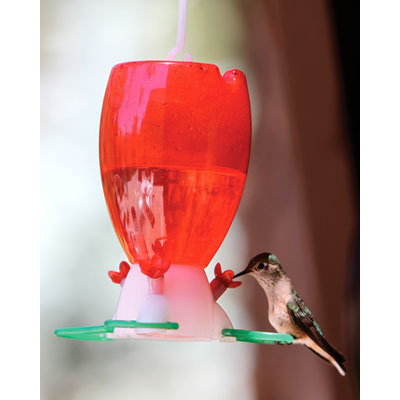Bees are extremely important to our food supply and fragile ecosystems. Usually bees are fairly harmless, but when hummingbird feeders are out trouble can start. After all, bees are always on the lookout for nectar!
 Nothing in nature is 100%
Nothing in nature is 100%
It isn’t possible to keep your feeders completely bee-free. In addition, no one method typically works alone. It’s the combination of a few of the strategies below that works. With those two disclaimers in mind, we’ll say this, it is possible to keep bees out of your hummingbird feeder without harming them most of the time. Just follow these tips:
Tips for keeping bees away from your feeder
These are all effective ways to help with a bee problem!
- Put away trash. Sugary trash, like soda cans or ice cream cartons, are likely to attract bees to the wrong places. Keep your trash put away and covered.
- Keep the feeder in the shade. Keep hummingbird and oriole feeders in the shade. Bees generally prefer full sunlight. By placing feeders in a darker spot, you’ll be less likely to attract bees.
- Offer sunny substitutes. Adding high-pollen plants and/or a substitute feeder for nectar in a sunny area will keep bees occupied there. As we stated earlier, bees are important to our food supply, so feeding them a higher-concentration nectar in a sunny area keeps them away from bird feeders and well fed–a win win situation!
- Buy a no-insect feeder. Choosing an insect-free saucer feeder, which keeps the nectar away from the feeding ports, helps cut down on bees at the feeder. Many new Hummingbird feeders even include bee guards.
- Yellow means stop when it comes to protecting your nectar feeders from bees. Bees are attracted to the color yellow, so look for feeders free of yellow accents.
Learn to live with bees
Bees are critical to our ecosystem. Using insecticides to rid your yard of bees does damage to our whole food supply. Try cohabitating with the bees, using the strategies above instead. In this way, you can enjoy the birds at your hummingbird feeder and the bees can continue helping our planet.

